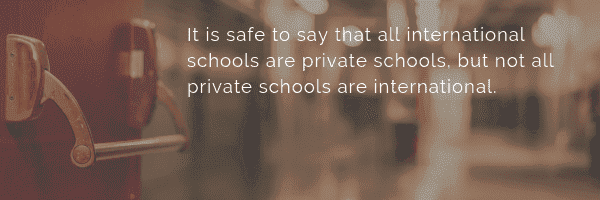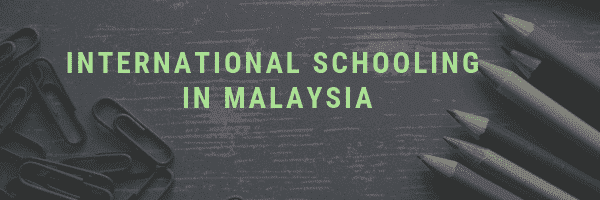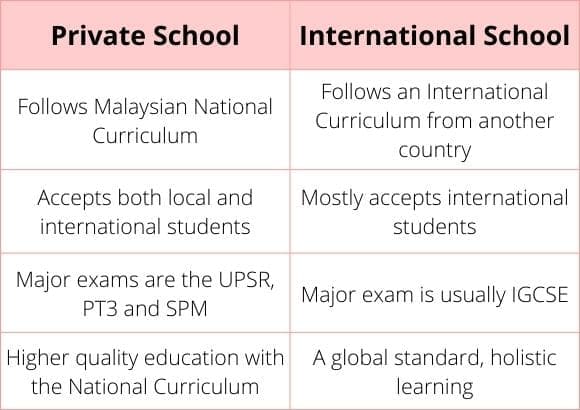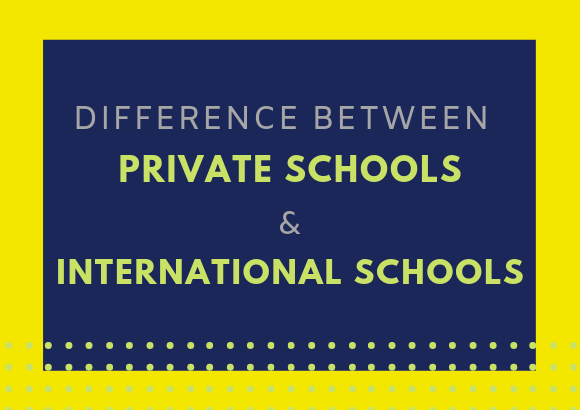Difference between International Schools and Private Schools in Malaysia
 Schooladvisor Team
Schooladvisor Team

Education plays a vital role in a child’s life for his/her development, lifelong learning or for future career decisions.
Being a parent is no easy task- one of the many responsibilities is giving your child the right education which follows by choosing the right school. This may be one of the hardest parental decisions as all the way though, you will ever have to make and this process requires thorough considerations.
Education in Malaysia
The Government is responsible for education in Malaysia. The Malaysian education system consists of education starting from pre-school to university. Pre-school, primary and secondary education is controlled by the jurisdiction of the Ministry of Education (MOE) while tertiary or higher education is the responsibility of the Ministry of Higher Education (MOHE). Private and international schools have been present in Malaysia for a long time now. You might want to learn how to apply to international schools and private schools.
However, to help you identify which one you prefer for your child, you have to know the difference between the two. This difference is similar to the difference between public schools and private schools.

Parents have frequently asked School Advisor on the difference between a private school or an international school.
So, here's the the distinction between PRIVATE SCHOOLING and INTERNATIONAL SCHOOLING:

Private schools in Malaysia are becoming increasingly popular among urban Malaysians and the international community- these are schools owned by non-government, non-state entities and they offer preschool, primary and secondary education. The main characteristic is that private educational institutions follow the Malaysian National Curriculum for Primary School Standard Curriculum (Kurikulum Standard Sekolah Rendah) and Secondary School Standard Curriculum (Kurikulum Standard Sekolah Menengah), as required by the Education Act 1996.These schools acquire funding through tuition fees paid by the students themselves- some offer scholarships.
Private Schools accept both local and international students. Students may have to take an assessment and an interview in order to gain entry. Some private schools may also provide full residential facilities for students in addition to their day school and offer a broader range of elective subjects, comprehensive co-curricular activities and extracurricular activities.
For preschools in Malaysia, the physical facilities and equipment provided to their students should be of high quality.
For primary education, which generally takes six years to complete, i.e, from standard one to standard six, children will be exposed to other subjects such as science, physical education, Islamic and moral education in addition to reading, writing and arithmetic. At the end of their studies in year 6, students will sit for the Primary School Achievement Test (UPSR) which tests mastery of Malay and English, mathematical skills and science concepts.
Secondary education takes approximately five years and comprises of lower secondary (Form 1 to Form 3) and Upper Secondary (Form 4 and Form 5). A wider range of subjects is offered and students can opt for a Science or Arts stream or a combination. Private secondary schools prepare students for two public examinations, namely the PT3 (Form 3 Assessment), and the SPM (Malaysian Certificate of Education) at Form 5. All these examinations are conducted by the Malaysian Examinations Syndicate (Lembaga Peperiksaan Malaysia). Few private schools offer the Malaysian Higher School Certificate (STPM) in the Sixth Form, opting instead to offer the A Levels or other alternatives. If you’re still unconvinced on choosing private schools, here’s 5 reasons to choose private schools.

International schools in Malaysia are different from private schools- as the former foundation is international education setup for their students by accepting curricula from another country (for instance the Cambridge International Examination or International Baccalaureate). Often, parents opt for international schools to make their children learn a specific foreign language offered by the school.
In Malaysia, the main and most popular types of curricula approved by the Education Ministry are the British, American, Australian, and Canadian curriculum (and more). The majority of these schools offer education from pre-school till students are to sit for an external international examination (like the IGCSE 'O' level, GCE 'A' levels or International Baccalaureate Diploma,..).
The Ministry of Education defines an International School as a private school which offers preschool, primary and secondary school education using an International Curriculum and English as the medium of instruction. These schools are not governed under the Education Act 1996 but are subject to supervision by the Ministry of Education through its Private Education Division.
International schools often provide different extra-curricular activities, superior amenities, smaller classes, and, sometimes, residential facilities. Many possess well-equipped science and computer laboratories, subject-based rooms for music, art and dance, well-stocked libraries, swimming pools, and outdoor and indoor sports courts. Although fees may be high at these schools, International schools allow parents to choose an alternative kind of education for their children - an education for the real world of global communication, international opportunity and cultural diversity. They offer a more child-centred and holistic approach to learning. Exposed to diverse experiences, students are encouraged to achieve their full potential across many different dimensions, academically, physically, spiritually and socially.
The differences between Private and International School

Once you have decided which one you think is the best for your child, you may want to research more information on the many available private or international schools in Malaysia. School Advisor is here to help you during the decision making process.
Visit our Schooladvisor Website to know more about the international school in Malaysia.

